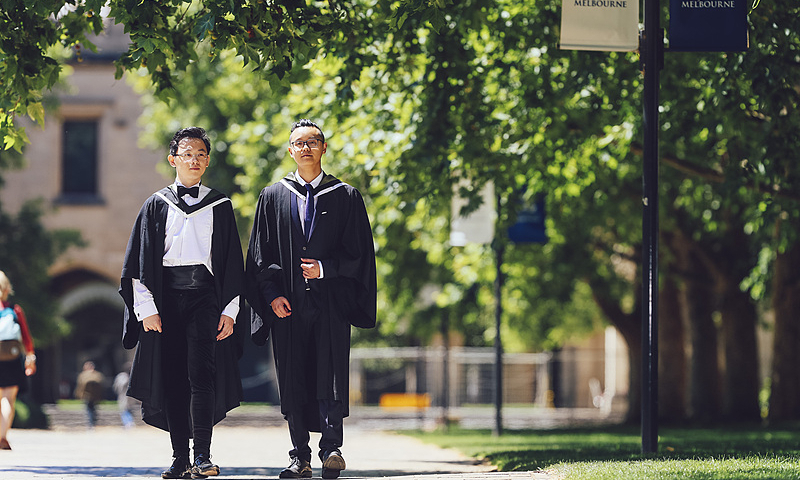
Chinese students studying in Australia Photo: VCG
As Australia grapples with a new policy capping the number of international students,
mk the dreams of many international students, including those from China, are hanging in the balance.
Elly Xing, a high school senior in Perth, is among those feeling the weight of uncertainty as she navigates her final year before university. Once set on pursuing a finance degree at the prestigious University of Melbourne, Elly now finds herself reconsidering her options in light of the recent changes that could reshape the landscape of international education in Australia.
Elly arrived in Perth last August after completing her second year of high school in Beijing. “I thought studying here would give me a chance to gain international knowledge and experience,” she reflects, as her voice is tinged with anxiety. “But now, with the new policy, I feel lost.”
The Australian government’s decision to limit the number of foreign students has sent ripples through the A$48 billion ($32.5 billion) international education sector, which has long been one of the pillars of the country’s economy. The decision, which was announced by Canberra, would limit the number of new enrolments to 270,000 for 2025, which is 53,000 fewer than last year, as Australia aims to ease record migration levels, Australian media outlet ABC reported.
With the cap on international students, Elly’s aspirations are increasingly clouded by doubt. The Group of Eight (Go8) in Australia, which comprises the country’s top-ranked universities, are expected to reduce their intake of foreign students, making the competition fiercer than ever. The University of Melbourne is also included in Go8.
“My parents are also suggesting I consider backup options,” she admits.
Elly is not alone in her predicament. Several other students from China share her concerns, and their carefully laid plans are now in jeopardy. One student said that had they known about the policy changes, they might have chosen to stay in Shanghai and prepare for the national college entrance examinations, also known as
gaokao. “It would have been more certain, and I could have had my family’s support,” they lamented.
A representative from a Sydney-based study abroad agency believes the new policy will primarily affect future applicants rather than those already enrolled in Australian universities. “Current students are unlikely to experience immediate changes, but the overall admissions landscape is expected to shift,” the representative told the Global Times.
The representative predicted that under the new guidelines, Australian educational institutions are expected to transition from an “open-door” policy to a more selective admissions process. Prospective applicants from China, particularly those aiming for popular programs at the prestigious Go8 universities, may face increasing challenges in securing spots, the representative noted.
Harsh oppositionAccording to media reports, the Australian government’s rationale for the caps centers on addressing the strain on housing and infrastructure caused by record migration levels. However, the Go8 argues that this approach is fundamentally flawed.
“The government is making a critical mistake,” Go8 Chief Executive Vicki Thomson told the Global Times in an exclusive written reply, calling the decision “draconian, interventionist” and “economic vandalism.”
This “rushed and poorly framed legislation” will have damaging consequences for the Australian tertiary education sector, economy, skilled workforce and the country’s international reputation, Thomson stated.
International students, particularly from China, have long been an important presence in Australia’s higher education landscape. They not only contribute significantly to university revenues but also enhance the cultural and intellectual diversity of campuses across the country. According to Australia’s Department of Education, Chinese students ranked first in terms of the number of new international students studying in Australia, with 153,504 new arrivals in January to May, followed by Indian and Nepalese students.
While noting the government has not explicitly targeted Chinese students with the new caps, the Go8 warns that no doubt that even the prospect of a cap will deter some international students from considering Australia as an option.
“Using international students as a scapegoat to manage a short-term spike in migration is a critical error,” Thomson added. “The prospect of a cap will deter some international students from considering Australia as an option, which is detrimental to our future.”
Spillover impactThe implications of these caps extend beyond the immediate impact on student numbers. The Go8 emphasizes that the funding generated from international student fees is vital for sustaining Australia’s research capabilities. “Go8 universities do the heavy lifting in research, accounting for 70 percent of all university research in Australia,” Thomson explained. “Currently Australia’s university research effort relies on funding from international student fee revenue.”
Also, there is growing apprehension within the Australian education sector regarding whether this cap is a final step in a series of restrictive policies or merely a small part of a larger plan, the Global Times learnt.
Australia’s economy is currently experiencing stagnation, with rising living costs and the looming threat of a recession adding to the pressures faced by local communities. Educators argue that reducing the influx of international students could further hinder economic growth at a time when it is most needed.
“We oppose measures that diminish economic growth potential during a crisis,” stated an education insider.
Shen Sheng contributed to this story

